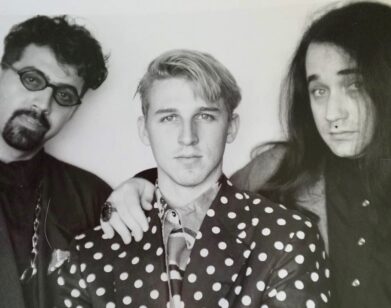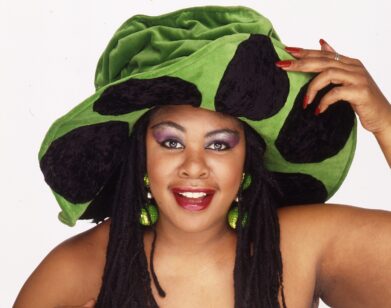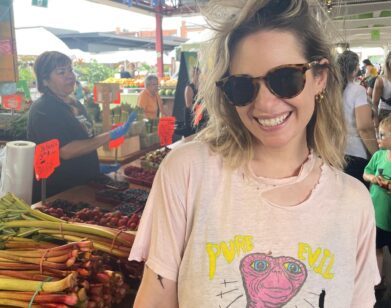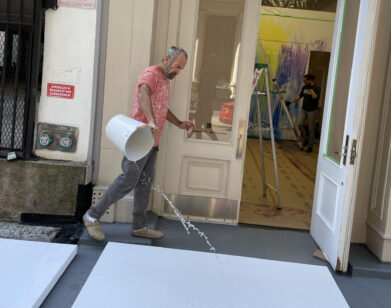Discovery: Brian Tyree Henry
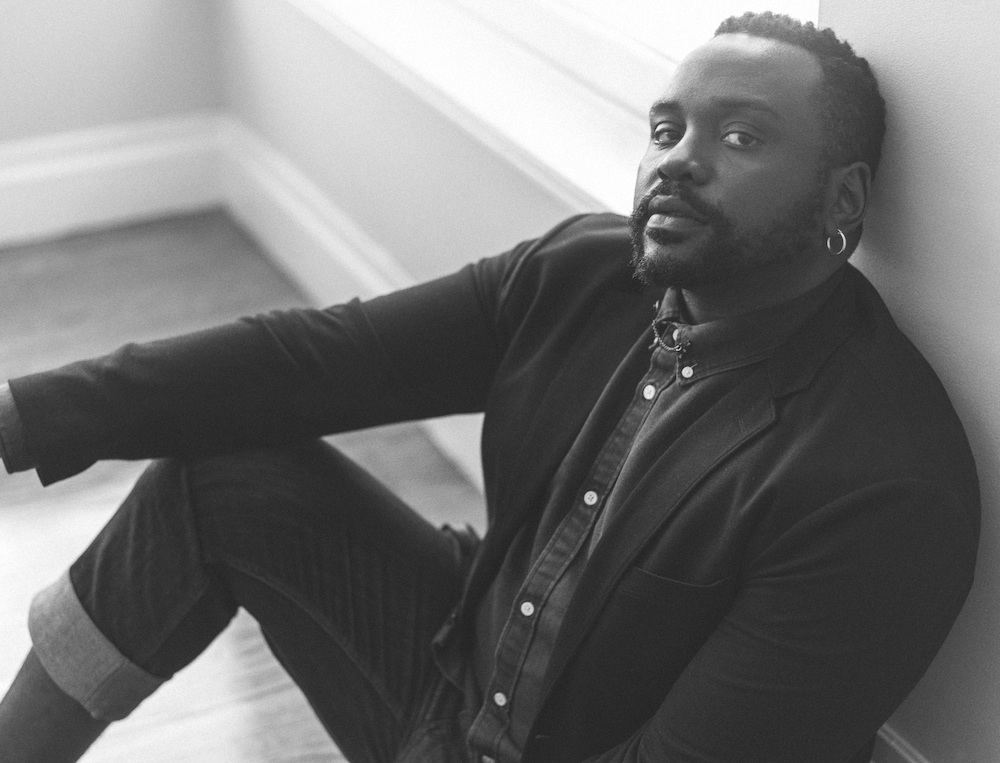
BRIAN TYREE HENRY IN NEW YORK, AUGUST 2016. PHOTO: CHRISTOPHER GABELLO. GROOMING: ALICIA CAMPBELL/SEE MANAGEMENT.
As soon as Brian Tyree Henry read the script for Donald Glover’s new series Atlanta, he knew wanted to play Alfred. Everything about the half-hour comedy-drama seemed to fit. Having spent four years at Morehouse College, Henry was familiar with and very fond of the show’s setting; he saw aspects of both himself and his father reflected in Alfred’s unaffected humor and familial loyalty. The rapport between Alfred and constant companion Darius (Keith Stanfield) reminded Henry of his relationship with his own late best friend Gabriel. “It just felt personal,” the 34-year-old actor explains at a noisy café in Tribeca. “I felt like I knew who Alfred was. All I could do was go in and give him my flair.”
The cast bonded immediately, too. “I have to stop using this analogy, but I always say I would drive their Bronco for them,” Henry says of Glover, who stars as Alfred’s cousin Earn, and Stanfield. “That’s how much I love them. ‘You call me, I don’t care, you don’t have to tell me nothing. I’ll be there. Let’s go.'”
Raised between Fayetteville, North Carolina, and Washington, D.C., Henry studied drama at Yale and got his start in New York City theater. He’s done several plays with the Public, and made his Broadway debut as the General in the original cast of The Book of Mormon. “I got to go up on stage and say, ‘Fuck you, God’ every single day. The thrill of it was just great, and it had the best message,” he recalls. In addition to Atlanta, which premiered on FX last night, the 34-year-old currently has a multi-episode arc on HBO’s Vice Principals opposite Danny McBride, Walton Goggins, and Kimberly Herbert Gregory. “I like that Danny McBride and Jody Hill gave me an opportunity to come and play in this beast of show,” he says. “Danny has a gift for showcasing these really awful people—awful people, but they still have needs and a heart.”
All of this success, however, has come at a particularly difficult time for Henry. The day after the Atlanta wrap party, Henry’s mother was killed in a car accident. The two were incredibly close. “It’s weird to see the ads and the commercials, because we did all of those on Mother’s Day and I remember talking to my mother the whole day,” he says. “I’m trying to figure it out how to maneuver through this and hold on to the joy of it. I’m trying to hold onto the joy of all this because this is what she wanted.”
AGE: 34
HOMETOWN: I was born in Fayetteville, North Carolina, which is where J. Cole is from. I went up to Washington D.C., where my mother moved, to stay with her, and then moved back to North Carolina to finish junior high and high school.
FAMILY BACKGROUND: My father was retired military and my mother was an educator. She was incredibly creative. I used to love going to her school during the summer and helping her decorate her classroom. I would draw Mickey Mouse, Donald Duck. She was a sixth grade teacher. She and my father are the ones that got me into my love of music. We were always playing music; music was incredibly influential in my house. It still is. I learned everything I know about music from my parents and my sisters.
A BOY AMONG WOMEN: I have four older sisters. I’m the only boy and the baby. When I was born, they were all teenagers. They were like, “What the hell is this? There’s another baby and it’s a boy? Are you kidding me?” But they’re the most important people I’ve ever met in my life. One of my sisters’ names is Peaches. I was like, “You’re going to love our ad campaign.” They’re coming to the premiere [in Atlanta]. It’s their first premiere with me. They also have never seen me in Atlanta—even when I was going to college, they never came down. I was like, “Don’t go crazy. Don’t lose your minds. But I got you. I’m about to show you Atlanta.” I’m really excited. I can’t believe they’re coming.
GROWING UP: Acting really started for me because I was in a house full of adults. They never shielded their lives from me. They were adults going through this world doing what they had to do. I used to like to watch them and imitate them. They all have their own distinct personalities; even though they’re family, we couldn’t be more different people. They had to go to work, my sisters were starting their families, so I had to find a way to entertain myself, really, and that’s when I got into acting. Every inch of our house was a playground and I created my own imaginary places in the house. I would imitate my family and the mannerisms of my father, which you see a lot in the character of Alfred. I look at it now and I’m like, “Alfred is my dad.” My dad is very charismatic and he always had poker games and spades games. People knew to go to my house for my mother and father’s parties, because my mother and father’s parties were the bomb. I used to be the server. I’d be this five-year-old kid walking around with a tray of cocktails.
BAND CAMP: I went to one of the predominantly black high schools in Fayetteville, E.E. Smith High School, and that’s where I started doing things like marching band. I played baritone horn and mellophone horn. Our marching band was one of the marching bands. It still is. If you look at Drumline and movies like that, that’s what our high school band was. The Magnificent Marching Machine was the name, and everyone came far and wide to see our band play. You had band camp, which you did all summer. I remember vomiting three times during band camp—you’re out in the sun in the South doing all these different kind of formations and dances. But it was worth it. It was great.
COLLEGE CAREER CHOICES: I didn’t get into theater until my sophomore year [of college] because I didn’t know acting was what I wanted to do. My family was pretty practical—as a young man having the opportunity to go to Morehouse, you should do business, you should do law. I was in a business management class and I was miserable. I hated the class. I used to stare out the window every day and day dream. My friends Theo and Will were like, “We’re auditioning for this play, man, we know you used to do speech and debate, you should audition.” So I auditioned for Joe Turner’s Come and Gone—that was the play they were putting on—and I got the lead. I love to study. I’m a geek. I liked learning the lines. There’s no greater charge than reading the story and you make this world in your head. I loved it. I loved going to class for theater, and I was surrounded by peers that reflected me. Everyone in that department, we’re still best friends to this day. They really, really pushed me to keep going.
GRADUATION DAY: A mentor of mine, Kent Gash, pulled me aside and was like, “What are you going to do now that you’re graduating?” I was like, “Eh, I’m going to go back to D.C. and be security.” That was what my sisters were doing. They were all working government security jobs there. And he just looked at me and was like, “No you’re not. You’re going to audition for [Yale].” So Crystal Dickinson, who was one of my teachers who’s also an amazing actress, helped me with my sides and I went in. I didn’t even know what a headshot was, so I hooked up with a friend and he took pictures of me and I went to Kinko’s. It was bad. And Yale said, “Come.”
LIFE IN NEW HAVEN: It was the best decision I ever made in my life. It was an intensive program, but I think Yale was more influential in terms of the people I met, the community, the collaboration. Most of the people I met at Yale, we are still great friends and we still collaborate. If it wasn’t for that school, I wouldn’t really know my way through this territory and terrain of theater and acting. It really gave me a chance to figure out where I fit within this big-ass realm. One thing that I went in to Yale with was to make to sure I left exactly how I came in, because that’s who they accepted. Take what you need, get what you need for your tool belt, but don’t lose the essence of who you are. I think I did it.
THE KING OF CATS: I had to leave school a little early because I booked a gig at Shakespeare in the Park—I got a lead in Romeo and Juliet. I was Tybalt and Romeo was Oscar Isaac. I had to do this huge fight in a pool of water in the middle of the park and it was the most invigorating thing in the world. That started my relationship with the Public Theater. I love the Public. I will always go back to the Public if they ask me.
BROOKLYN BEGINNINGS: My first apartment in New York was in Sheepshead Bay, Brooklyn. Don’t ask. I had to commute from Sheepshead Bay to the Public. It was only in Sheepshead Bay that I realized all the avenues go from A to Z, but there’s not [an Avenue] Q … did you know that? I had to traverse all the way out. I could see the Wonder Wheel [amusement park] from my house. I had to walk 20 minutes to the train, take the train all the way in every day, and I would do it again. That’s when I was doing this play called The Brothers Size written by Tarell Alvin McCraney, who is a classmate of mine. I orginated this part and I loved this play. I went on to play that part from the age of 21 until I was 27. We did a season there and then we toured and we came back and I didn’t have anything. But I was like, “You know what? I’m here in New York, I’m going to make it.” I remember having my EBT Card—my food stamps. I’d get unemployment, but I never was worried. I was like, “I know it’s going to come.” I didn’t want it to consume me, but I knew it would happen me.
ACTING GOALS: I know it sounds clichéd as hell, but I’d never take anything for the money. I’m only going to follow my heart. If it’s something that I know I can’t wake up every day and do, then why fucking do it? If I can’t envision myself actually finding something new or diving deeper into what this thing is, then why? And that’s no judgment on any other actor that has to do it. I get that. I just don’t like that. I want to do things that really mean something to me, that will challenge me and entice me in a different way. I’m grateful for Book of Mormon, it allowed me to live a certain way, but I knew that Broadway musicals weren’t my calling. There are people that have studied musical theater their whole life and have gone to Carnegie Mellon and this is what they wanted. I didn’t want to be a foreigner in this land that I hadn’t cultivated on my own. That’s why it was okay for me to bow out when I left: “Let me step back and really find out what it is that I want.” It took a minute.
AN UNIMAGINABLE LOSS: I never thought I’d be living in this place of such greatness and happiness without my mom. I never thought I would land a lead on a television show working with such great people as Donald Glover, Keith Stanfield, Zazee [Beetz], and Hiro Murai without sharing it with my mom. This week is kind of weird because I had plans. I was like, “My mom is my date. We are going to the premiere together.” She was with me the whole step of the way through this. My entire career, she has been the person who’s pushed me forward to keep doing it. She had, in her house, this little shrine. Whatever college I graduated from, I gave the degree straight to her: “This is for you.” So she has all these posters of every play that I’ve done; she still has programs from my first play when I was in high school, The Colored Museum by George C. Wolfe, whom I’ve had the pleasure of working with in my life. She has posters of stuff that I don’t even have. I was like, “Did you go to the theater and steal this out of the case? Because that case was locked…” She was very proud and very happy, and she believed in me when I didn’t think I could do anything. All this is for her.
ATLANTA AIRS TUESDAY NIGHTS ON FX. VICE PRINCIPALS AIRS SUNDAY NIGHTS ON HBO.

